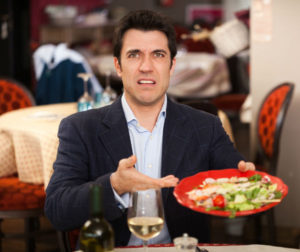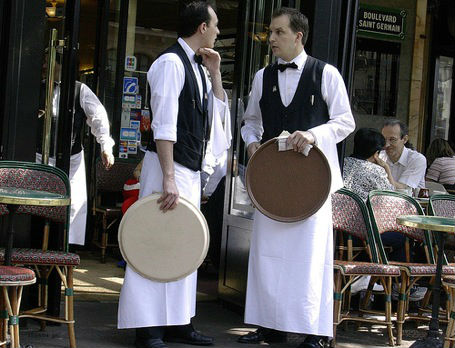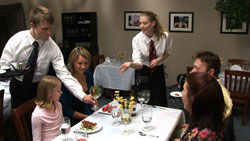Anyone who thinks being a waiter is an easy job has obviously never waited tables. One thing that makes restaurant work so uniquely challenging is dealing with infinite permutations of human stupidity on a nightly basis and having to adjust your behavior accordingly. There are no algorithms to crack the code of people’s ridiculousness, you just have to roll with whatever comes your way. It’s part of the job to maintain your composure and stay neutral under extreme duress. Speaking up for yourself or calling someone out for being an ass will come at the expense of your tip and may even cost you your job.
My mettle was tested on a recent night by my last table, who arrived just before closing. It’s frequently busy late where I work so it’s not uncommon, even on slower weekday nights, for a new table to be seated after 11pm. Seeing them sit down broke my spirit—the demoralizing feeling you get when you think you’ve climbed to the top of the mountain and you realize the peak is actually miles away—but I was determined to show them a good time. I took a deep breath, aligned my chakras, grabbed four menus and forced a smile over my face.
There were two couples in their mid-to-late forties seated at my new table. Without reciprocating my greeting, they informed me they were expecting a couple of martinis they had ordered from the bar while they were waiting. I assured them I would inquire as to the whereabouts of their cocktails and quickly recited the specials. Of course they ignored most everything I said, convinced that more exciting information could be gleaned from inside the backlit nothingness of their cellphone screens. I made a few recommendations after delivering their drinks and informed them that the kitchen would be closing shortly. The men seemed a little drunk but the situation was nowhere near amber alert.
backlit nothingness of their cellphone screens. I made a few recommendations after delivering their drinks and informed them that the kitchen would be closing shortly. The men seemed a little drunk but the situation was nowhere near amber alert.
Before the first course arrived they called me over to change one of their main courses. You want the shrimp instead of the lamb? No problem. I told the kitchen to cancel lamb, ordered the shrimp and asked the manager for a void. The appetizers arrived. When I checked back to make sure everything was alright, the first course was fine but they’d decided on second thought they really didn’t want the shrimp after all. I could feel my chakras pulling apart. I trudged back to the kitchen muttering obscenities under my breath. Thankfully, the shrimp hadn’t been cooked yet so it wasn’t a problem. The moment the squishy, opalescent crustaceans hit the grill, it’s a different story. The chef looked at me, as he often does, like I was out of my mind. I begged him, as I always do, not to shoot the messenger.
I went back to the manger to ask for another void. “Are these people serious? Didn’t they just change this to shrimp?” she asked, entering her passcode into the POS terminal. She already knew the answer to both questions, so I remained silent. My mantra: I can only speak for myself.
When I returned to the table to clear the appetizer plates, they insisted on canceling the rest of their main courses because they’re already full. “I’m sorry,” I interrupted, “the rest of your food is on the way,” I didn’t need to check with the chef, my manager or anyone. Canceling food in a restaurant is not something you do whimsically based on how full you get. It doesn’t work that way. “I can’t cancel anything else. I’ve tried to do everything I can to this point. The food is coming.” I had transformed into an angry parent who’d reached his wit’s end. They were petulant little children needing discipline.
About five minutes later one of the women got up from the table and cornered me in the wait station. I thought she was going to ask me for directions to the restroom. She seemed a bit shaken.
“I’m really sorry. I don’t mean to be rude but the guys we’re with are really drunk and we need to get out of here right now,” she said with the impermanent desperation of an entitled white person.
“Well… I’m sorry to hear that.” I tried my best to sound sympathetic but stayed on message. “Unfortunately, your main courses are about to be served so if you want I can wrap them up for you?”
“That’s ok. We’ll pay for it. I’m really sorry. They’re just sooo drunk, we really need to go right now.”
 So, I returned to the kitchen to ask the chef to wrap everything to go. He’s annoyed but less annoyed than if I’d canceled the order outright and the food went to waste. “These people are out of control,” he said, giving me the stink eye. I don’t say anything. I’m already showing symptoms of PTSD. “No problem, dude. We’ll wrap it.” His voice sounded relieved all of a sudden. These moments have a way of reminding chefs how fortunate they are not to have to deal directly with the people who eat their food.
So, I returned to the kitchen to ask the chef to wrap everything to go. He’s annoyed but less annoyed than if I’d canceled the order outright and the food went to waste. “These people are out of control,” he said, giving me the stink eye. I don’t say anything. I’m already showing symptoms of PTSD. “No problem, dude. We’ll wrap it.” His voice sounded relieved all of a sudden. These moments have a way of reminding chefs how fortunate they are not to have to deal directly with the people who eat their food.
I returned to the table with the check in my hand and present it with a restrained smile.
“We are wrapping the rest of the food for you and it should be arriving shortly.” Everyone looks back like I’m speaking a foreign language. As I began to remove the clean share plates and flatware from the table, I realized that the woman who pulled me aside has not said anything to her company about her exit plan. So to everyone else, it looks like I went rogue and decided to evict them.
I shoot her a piercing glare. “She asked me to wrap your food and told me you needed to go.” Everyone at the table turns toward her.
“No, I didn’t,” she stared at me intently like someone who wants you to know they’re upset you blew their cover. If she was going to throw me under the bus like that, I was determined to take the bus down with me. My feet feel heavy in my worn-out black waiter shoes and I can’t move, still with rage.
“We didn’t just have a conversation, just now, where you asked me to wrap the food and told me you needed to leave right away?”
“No, I never said that.” She looked around nervously like a fidgety witness under cross-examination. I was the defendant’s lawyer, arguing a losing case.
“There are two ways this can go,” one of the drunk men interjected, “1) You can cancel the food or 2) You can serve it to us at the table.”
“I think there are more than two ways this can go, my friend,“ I said, beginning to lose my cool.
Rather than outline the different outcomes I envisioned, I gently replaced their table settings and did what any other self-respecting server would do in this situation—I ran crying to my manager. We removed the food from the to-go containers, re-plated it with the chef’s help and brought it to the table. They barely finished anything and then, without irony, asked us to wrap what was left. The two men at the table split the bill—both tips were well below average, one tipped under ten percent. I struggled to find an argument for why I deserved to be tipped poorly. There wasn’t one. There usually isn’t. Adding insult to injury, they stayed for another round of drinks at the bar.
This situation highlights the dilemma that most people who work in restaurants face almost every night. You have no leverage when conflict arises. There is only one side to every story. The most apocalyptic reviews on Yelp always feature stories written by omniscient first person narrators. They might as well all be titled: “It happened because I say it happened.” At the end of the day, waiters keep their mouths shut because they know they’ll always end up on the losing side of the argument.
For those of us who make a living serving people, effacing yourself for the edification of others takes its toll over time because, like battered spouses, our sacrifices are so rarely appreciated. There is nothing to protect you from the abuses of guests who revel in exploiting the server-master relationship. Part of surviving life in the restaurant business is learning to accept the muzzle you wear everyday. No matter how badly people treat you, you can never stoop to their level, not if you value your job. When they go low, we go high. Because the customer may not always be right, but the customer will always have the last word.



